SWEDISH
SOUTH ASIAN STUDIES NETWORK
Newsletter 99:
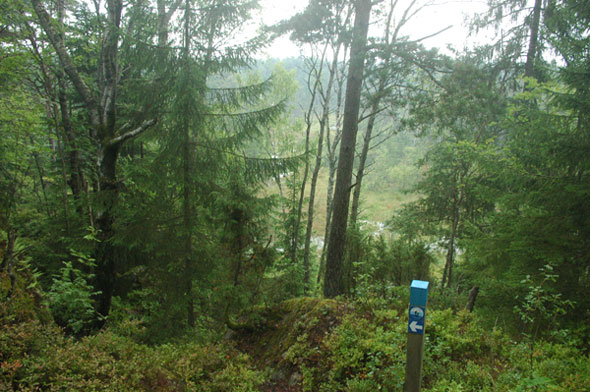 23 July 2009
23 July 2009
| Educational News |
| Lectures and seminars |
| Business and Politics |
| South Asia related Culture |
| New and updated information |
 • Internal evaluation report of SASNET activities 2005–2009
• Internal evaluation report of SASNET activities 2005–2009
An internal evaluation of SASNET’s activities during the period 2005–2009 has been carried out. SASNET was founded in 2001 and has since its inception been funded jointly by the Swedish International Development Cooperation Agency, Sida, and Lund University. The latter contributes roughly one-third of its annual budget of approximately SEK 2.6 million. This funding remains in effect until the end of 2009.
Unfortunately, Sida will most probably not be able to fund SASNET after that date for reasons that are reportedly bureaucratic or political, and not in any way related to the quality of SASNET’s work. An external evaluation conducted in 2005 by Sida concluded that SASNET has been highly successful (see this evaluation report written by Carla Risseeuw, Ghanshyam Shah and Lennart
Wohlgemuth). Recently, a brief internal evaluation of SASNET was conducted by Dr. Stig Toft-Madsen, who worked as assistant director of SASNET during the period December 2008 to June 2009. At present, staff at SASNET are actively seeking underwriting to keep the organisation viable for the foreseeable future.
Read the 2009 internal evaluation review report of SASNET activities.
• 30 applications for SASNET planning grants
30 applications were
received for the 2009 round of SASNET Planning Grants. Last
date for applications was 15 June 2009. Out of the 30
applications, 1 refer to continued networking grant for research programmes/projects,
16 for networking regarding new research programmes/projects, and 3 for new educational programmes/projects. Another 6
applications refer to Interdisciplinary Workshop Grants (for organising
a South Asia related research workshop in Sweden or in South Asia);
and finally 4 applications refer to the Guest Lecture Programme
(for inviting a guest lecturer from South Asia, to give lectures
at more than one Swedish university). The applications
will now be screened by a reference group consisting
of three eminent Nordic South Asia scholars, and final decisions
be taken by the SASNET board on its next meeting on Tuesday 22 September
2009. All previously distributed SASNET grants are presented on our web page. Go for the list of SASNET planning grants 2001–2008.
• Follow Lars Eklund through his web blog
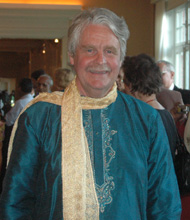
 Do not miss out on Lars Eklund’s new blog sasnettoday.blogspot.com. This is a blog that may focus on the day-to-day activities of Lars, working as deputy director/webmaster with the Swedish South Asian Studies Network since 2001. However, it may just as well deal with Lars’ many extramural South Asia/India related activities in Sweden and elsewhere. He used to be editor for the SYDASIEN magazine for a period of 25 years, has travelled extensively in all the South Asian countries from 1972 and onwards, and lives with his Indian wife Bubu. Besides he is well acquainted with South Asian history and religion, culture and music.
Do not miss out on Lars Eklund’s new blog sasnettoday.blogspot.com. This is a blog that may focus on the day-to-day activities of Lars, working as deputy director/webmaster with the Swedish South Asian Studies Network since 2001. However, it may just as well deal with Lars’ many extramural South Asia/India related activities in Sweden and elsewhere. He used to be editor for the SYDASIEN magazine for a period of 25 years, has travelled extensively in all the South Asian countries from 1972 and onwards, and lives with his Indian wife Bubu. Besides he is well acquainted with South Asian history and religion, culture and music.
Go for Lars Eklund’s SASNETTODAY blog.
• SASNET web pages updated by Geoffrey Gardella
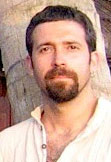 SASNET has engaged Mr. Geoffrey Gardella on a short-term assignment during the summer 2009 to assist the webmaster, Lars Eklund, to improve the graphic design on important SASNET web pages. Geoffrey is both a geographic and academic wanderer. With a master's degree in German from University of California Berkeley, he has also studied Hindi in Mussoorie and Saami at Umeå University. In between academic careers, he has worked in Silicon Valley. He is now a Master's degree student within the South Asia track at the Centre for East and South-East Asian Studies, Lund University. His area of focus is the intersection of food, culture and identity in India. He participated in the June 2009 Asian Dynamics Initiative conference at the University of Copenhagen, where he presented a paper entitled ”Udupi Hotels: Entrepreneurship, Reform and Revival”, written together with Stig Toft-Madsen from SASNET.
SASNET has engaged Mr. Geoffrey Gardella on a short-term assignment during the summer 2009 to assist the webmaster, Lars Eklund, to improve the graphic design on important SASNET web pages. Geoffrey is both a geographic and academic wanderer. With a master's degree in German from University of California Berkeley, he has also studied Hindi in Mussoorie and Saami at Umeå University. In between academic careers, he has worked in Silicon Valley. He is now a Master's degree student within the South Asia track at the Centre for East and South-East Asian Studies, Lund University. His area of focus is the intersection of food, culture and identity in India. He participated in the June 2009 Asian Dynamics Initiative conference at the University of Copenhagen, where he presented a paper entitled ”Udupi Hotels: Entrepreneurship, Reform and Revival”, written together with Stig Toft-Madsen from SASNET.
• SASNET contact visits to KTH, Stockholm, and Mälardalen University, Västerås
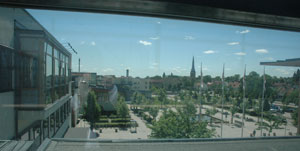
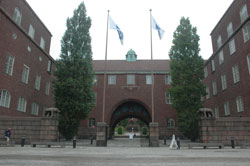 Anna Lindberg and Lars Eklund from SASNET visited Stockholm and Västerås on 15–16 June 2009. The visit to Stockholm focused on discussions regarding possible forms for continued funding for SASNET from 2010, with visits to the Royal Institute of Technology (KTH), and the Swedish International Development Cooperation Agency, Sida. They also made some networking visits to a couple of research departments at KTH – the Dept. of Land and Water Resources
Engineering, and the KTH Department of Aeronautical and
Vehicle Engineering, actively engaged in South Asia related projects.
Anna Lindberg and Lars Eklund from SASNET visited Stockholm and Västerås on 15–16 June 2009. The visit to Stockholm focused on discussions regarding possible forms for continued funding for SASNET from 2010, with visits to the Royal Institute of Technology (KTH), and the Swedish International Development Cooperation Agency, Sida. They also made some networking visits to a couple of research departments at KTH – the Dept. of Land and Water Resources
Engineering, and the KTH Department of Aeronautical and
Vehicle Engineering, actively engaged in South Asia related projects.
Lars continued to Västerås to meet researchers and programme coordinators at Mälardalen University, working on South Asia related collaboration projects in research and education, including the ongoing Erasmus Mundus External Cooperation programme EURECA. Read a report from Anna’s and Lars’ visit to Stockholm and Västerås.
• SASNET organises Mahatma Gandhi seminar in September
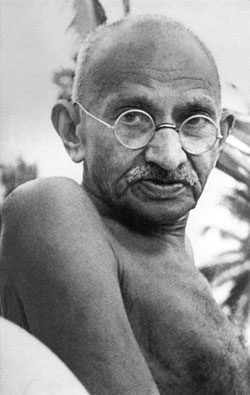
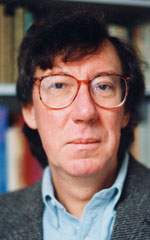 David Arnold, Professor of Asian and Global History at the University of Warwick, UK will participate in a SASNET seminar on Mahatma Gandhi, to be held in Lund on Thursday 10 September 2009, 19.00–21.00.
Prof. Arnold, who is also a Fellow of the British Academy, will talk about ”Gandhi: The Mahatma and the Machine”. Arnold was formerly Professor of South Asian History at the School of Oriental and African Studies (SOAS) in London and was a founding member of the Subaltern Studies group of South Asia scholars whose work helped to transform the writing of Indian history in the 1980s and 1990s.
David Arnold, Professor of Asian and Global History at the University of Warwick, UK will participate in a SASNET seminar on Mahatma Gandhi, to be held in Lund on Thursday 10 September 2009, 19.00–21.00.
Prof. Arnold, who is also a Fellow of the British Academy, will talk about ”Gandhi: The Mahatma and the Machine”. Arnold was formerly Professor of South Asian History at the School of Oriental and African Studies (SOAS) in London and was a founding member of the Subaltern Studies group of South Asia scholars whose work helped to transform the writing of Indian history in the 1980s and 1990s.
David Arnold taught an undergraduate course on Gandhi and Gandhism at SOAS for many years and in 2001 published a work on Gandhi in the ‘Profiles in Power’ series. His current research is on everyday technology in India from 1880 to 1960. This includes a reappraisal of Gandhi’s significance as a critic of modernity and his impact on technological change in twentieth-century India. This is part of the background to his Lund University presentation.
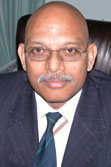 H.E. Mr. Balkrishna Shetty, Ambassador of India to Sweden (photo to the right), will talk on ”The Relevance of Mahatma Gandhi in today’s World”. Mr. did his B.Sc Honours in Mathematics from Presidency
College, Calcutta (1970) and M.Sc. (Mathematics) from Indian Institute of
Technology, Kanpur (1972). After a period of research in Mathematics at the Tata
Institute of Fundamental Research, Mumbai, he joined Indian Statistical Service in
1973 and was Assistant Director, dealing with Industries and Trade Statistics in
Central Statistical Organisation, Government of India, New Delhi. He has been
India’s Ambassador to Sweden since January 2009.
H.E. Mr. Balkrishna Shetty, Ambassador of India to Sweden (photo to the right), will talk on ”The Relevance of Mahatma Gandhi in today’s World”. Mr. did his B.Sc Honours in Mathematics from Presidency
College, Calcutta (1970) and M.Sc. (Mathematics) from Indian Institute of
Technology, Kanpur (1972). After a period of research in Mathematics at the Tata
Institute of Fundamental Research, Mumbai, he joined Indian Statistical Service in
1973 and was Assistant Director, dealing with Industries and Trade Statistics in
Central Statistical Organisation, Government of India, New Delhi. He has been
India’s Ambassador to Sweden since January 2009.
The Gandhi seminar will be held in the auditorium of Lund University’s Centre for Languages and Literature (SOL-Centrum), Helgonabacken 14, Lund. All are welcome.
• Inauguration of Lund University’s Mahatma Gandhi books collection
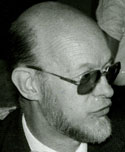 Earlier the same day, on Thursday 10 September 2009, at 15.00, the Mahatma Gandhi books collection (part of the Karl Reinhold Haellquist Memorial Collection) will be formally inaugurated by the Ambassador of India to Sweden, Mr. Balkrishna Shetty. SASNET has taken care of and catalogued a large books donation from the private library collection of the
renowned Swedish historian Karl Reinhold Haellquist (photo), who passed
away in 2000 after working for many years at the Nordic Institute of Asian Studies
(NIAS) in Copenhagen. A large part of the collection, more than 6 000 South Asia related
books, journals, videotapes and pamphlets on various aspects
of South Asian studies, was later donated to SASNET/Lund University by his wife, Inger Sondén-Haellquist. The collection includes Haellquist’s unique collection of books on Mahatma Gandhi, that is now on display in Lund University’s Asia Library at Scheelevägen 15 C. More information about the Karl Reinhold Haellquist Memorial Collection.
Earlier the same day, on Thursday 10 September 2009, at 15.00, the Mahatma Gandhi books collection (part of the Karl Reinhold Haellquist Memorial Collection) will be formally inaugurated by the Ambassador of India to Sweden, Mr. Balkrishna Shetty. SASNET has taken care of and catalogued a large books donation from the private library collection of the
renowned Swedish historian Karl Reinhold Haellquist (photo), who passed
away in 2000 after working for many years at the Nordic Institute of Asian Studies
(NIAS) in Copenhagen. A large part of the collection, more than 6 000 South Asia related
books, journals, videotapes and pamphlets on various aspects
of South Asian studies, was later donated to SASNET/Lund University by his wife, Inger Sondén-Haellquist. The collection includes Haellquist’s unique collection of books on Mahatma Gandhi, that is now on display in Lund University’s Asia Library at Scheelevägen 15 C. More information about the Karl Reinhold Haellquist Memorial Collection.
• Complete programme for SASNET’s Falsterbo conference
The programme for SASNET’s Nordic conference on South Asian Studies for young scholars, to be held in Falsterbo 17-19 August 2009, is now complete. The aim of the conference is to gather master students, doctoral students, postdoctoral researchers and other junior scholars in the Nordic countries (including Denmark, Finland, Iceland, Norway and Sweden) who focus on South Asia in their research studies. 50 persons have been accepted as participants to the conference, that is convened by Dr. Kristina Myrvold, Lund University, and Ms. Julia Velkova, Gothenburg University. The aim behind the conference, which is similar to a conference that SASNET organised in Marstrand in 2002 (more information), is to provide an opportunity for young scholars to present their future and ongoing research projects, establish contacts with colleagues in the Nordic countries, and discuss the challenges and opportunities of career planning and conducting research in South Asian Studies. See the complete programme (as a pdf-file)
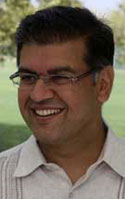 The keynote speaker will be Prof. Vinayak Chaturvedi (photo), University of California Irvine. He will lecture about ”Dialogues with M.K. Gandhi on History and Violence in India”. Other principal speakers will be Prof. Pamela Price, Oslo University, who will talk about ”Being a South Asianist in the Nordic countries: Being Glocal”; and Dr. Mirja Juntunen, Uppsala University, coordinator of the Nordic Center in India (NCI), who will talk about ”A Nordic Perspective on Prospects and Challenges for Scholarly Interaction with South Asia”.
A workshop will be led by Editor Teddy Primack, Academic Documents Associates, New York, the workshop being entitled ”How to displease an editor”. A number of thematic sessions will be led by Prof. Knut A. Jacobsen, University of Bergen; Dr. Peter B Andersen, Copenhagen University; Dr. Catarina Kinnvall, Lund University; Dr. Per Hilding, Stockholm University; and Dr. Per Knutsson, Gothenburg University.
The keynote speaker will be Prof. Vinayak Chaturvedi (photo), University of California Irvine. He will lecture about ”Dialogues with M.K. Gandhi on History and Violence in India”. Other principal speakers will be Prof. Pamela Price, Oslo University, who will talk about ”Being a South Asianist in the Nordic countries: Being Glocal”; and Dr. Mirja Juntunen, Uppsala University, coordinator of the Nordic Center in India (NCI), who will talk about ”A Nordic Perspective on Prospects and Challenges for Scholarly Interaction with South Asia”.
A workshop will be led by Editor Teddy Primack, Academic Documents Associates, New York, the workshop being entitled ”How to displease an editor”. A number of thematic sessions will be led by Prof. Knut A. Jacobsen, University of Bergen; Dr. Peter B Andersen, Copenhagen University; Dr. Catarina Kinnvall, Lund University; Dr. Per Hilding, Stockholm University; and Dr. Per Knutsson, Gothenburg University.
Finally there will be a number of senior Nordic researchers from the SASNET network who will act as ”champions” in plenary sessions on important issues. Selected student participants will prepare these sessions. Among confirmed ”champions” are Prof. Bo Lindblad, Karolinska Institutet; Dr. Anna Godhe, Gothenburg University; Dr. Jan Magnusson, Lund University; Dr. Christer Norström, Stockholm University, Prof. Devdatt Dubhashi, Chalmers University of Technology; Dr. Zarina Kabir, Karolinska Institutet; and Prof. Staffan Lindberg, Lund University.
Venue: Falsterbo Kursgård, Ljungvägen 1, Höllviken (south of Malmö). More information in the conference web site.
• More information about SASNET and its
activities
See SASNET’s page, http://www.sasnet.lu.se/sasnet.html
• Six India/South Asia ECEMW programmes selected for 2009–10
On 17 June 2009, the decisions on Erasmus Mundus External Cooperation Window (EMECW) programme proposals regarding mobility activities between Europe and India/South Asia starting in the academic year 2009–2010 were announced. The decisions were taken on behalf of the European Commission (EC) by its Education, Audiovisual and Culture Executive Agency (EACEA) in Brussels.
This year, two geographical window lots are dedicated to South Asia. Lot 13 focuses entirely on collaboration with India, whereas Lot 11 includes collaboration also with Afghanistan, Bhutan, Nepal, Pakistan and Bangladesh. Four university consortia have been selected to run programmes under the India lot 13, and two consortia have been selected under the South Asia lot 11. Each selected Erasmus Mundus External Cooperation Window programme will have a budget of roughly around EUR 5 million per year to spend on mobility for students, teachers, researchers, and academic staff in both directions between Europe and India/South Asia.
The selected programmes are the following:
Lot 11, programme 1
Consortium formed by 8 universities in Europe, and 11 universitites in Asia (Afghanistan 1, Bangladesh 3, Bhutan 1, India 2, Indonesia 1, Nepal 1, Pakistan 1, Thailand 1). The programme is coordinated by Aalborg University, Denmark. Prof. Ramjee Prasad (photo), Dept. of Communication Technology, Aalborg University, is the main coordinator. Mobility flow: 179 individuals per year. More information about the programme (as a pdf-file).
Lot 11, programme 2
Consortium formed by 11 universities in Europe, and 9 universitites in Asia (Afghanistan 1, Bangladesh 2, Bhutan 1, India 1, Indonesia 1, Nepal 1, Pakistan 2). The programme is coordinated by Vrije Universiteit Brussel, Belgium. Mobility flow: 240 individuals per year. More information about the programme (as a pdf-file).
Lot 13, programme 1
Consortium formed by 9 universities in Europe, and 8 universities in India (Amrita University, Coimbatore; Anna University, Chennai; Indian Institute of Technology (IIT) Delhi; Indian Statistical Institute, Kolkata; Jadavpur University, Kolkata; Kakatiya University, Warangal; University of Pune; and Centre of Environmental Planning and Technology, Ahmedabad). The programme is coordinated by Politecnico di Torino, Italy. Mobility flow: 200 individuals per year. Nordic partner universities in the consortium: Royal Institute of Technology (KTH), Stockholm; and Helsinki University of Technology, Finland. More information about the programme (as a pdf-file).
Lot 13, programme 2
Consortium formed by 12 universities in Europe, and 8 universities in India (University of Delhi; Jadavpur University, Kolkata; University of Pune; University of Kerala; Indian Institute of Technology (IIT) Kanpur; Tata Institute of Social Sciences (TISS), Mumbai; Pravara Institute of Medical Sciences, Loni, Maharashtra; Anand Agricultural University, Gujarat). The programme is coordinated by Lund University, Sweden. Dr. Sidsel Hansson (photo), Division of International Relations, Lund University, is the main coordinator. Mobility flow: 183 individuals per year. Other Nordic partner universities in the consortium: Karolinska Institutet, Stockholm; and Norwegian University of Science and Technology (NTNU), Trondheim. More information about the programme (as a pdf-file).
Lot 13, programme 3
Consortium entitled ”EURINDIA” formed by 10 universities in Europe, and 9 universities in India (Anna University, Chennai; Anurag Narayan College, Gaya; Patna University; Indian Institute of Technology (IIT) Guwahati; Indian Institute of Technology (IIT) Roorkee; National Law School of India University, Bangalore; Tamil Nadu Agricultural University (TNAU); University of Kalyani, West Bengal; University of Pune). The programme is coordinated by Royal Institute of Technology (KTH), Stockholm, Sweden. Ms. Alphonsa Lourdudoss at the International Office, KTH, is the main coordinator. Mobility flow: 201 individuals per year. More information about the programme (as a pdf-file).
Lot 13, programme 4
Consortium entitled ”WILLPower, Window India Learning Link Power” formed by 10 universities in Europe, and 7 universities in India (Indian Institute of Science (IISc), Bangalore; Anna University, Chennai; University of Delhi; Indian Institute of Technology (IIT) Madras, Chennai; Indian Institute of Technology (IIT) Guwahati; Indian Institute of Technology (IIT) Kanpur; Indian Institute of Technology (IIT) Rajasthan). The programme is coordinated by Ecole Centrale Nantes, France. Mobility flow: 210 individuals per year. More information about the programme (as a pdf-file).
The EMECW consortium coordinated by Lund University was also selected last year (2008) along with three other India/South Asia related EMECW mobility programmes. The Lund University programme was then entitled Lot 15, and included a much wider mobility scheme between Europe and India than the new Lot 13 lots. The partnership programme that was selected in 2008 is currently running at full speed. The mobility of approximately 340 individuals consisists of a flow by 75 % from India to Europe, and 25 % from Europe to India. More information on the Lot 15 project web site.
The same applies more or less to the three South Asia partnership programmes selected in 2008.
Mälardalen University in Västerås, Sweden coordinates what used to be entitled Lot No. 12. The university consortium behind this programme comprises of 16 universities, nine in Europe and seven in South Asia – out of which 4 are in India, and 1 each in Nepal, Pakistan and Sri Lanka. The programme is entitled EURECA ( European Research and Collaboration Project with Asia), and has a mobility flow of 320 fully funded students, researchers and academic staff per year. Prof. Sasikumar Punnekat at the School of Innovation, Design and Engineering, Mälardalen University, is the main coordinator. The programme did not receive continued funding for its 2009 application. More information on the EURECA web page.
University of Bradford, UK was selected in December 2008 to coordinate what is known as the Asia Regional programme 1. The consortium consists of 5 universities in Europe and 6 universities in Asia – including Bangladesh, Bhutan, Nepal and Pakistan. The programme has a mobility flow of 344 fully funded students, researchers and academic staff per year.
The consoritum/programme is built upon a previous European Commission funded collaborative project named eLINK. More information on the eLINK web page.
University of Nice Sophia-Antipolis, France was also selected in December 2008 to coordinate what is known as the Asia Regional programme 2. The consortium consists of 9 universities in Europe and 8 universities in Asia – including Bangladesh, India and Pakistan. The consortium is named EMMA (Erasmus Mundus Mobility with Asia). More information on the EMMA programme’s web page.
• Proceedings from the 2008 Sida conference in Uppsala now published
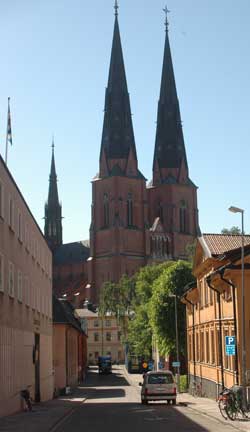
![]() The proceedings from the Sida financed conference ”Meeting Global Challenges in Research Cooperation”, held in Uppsala in May 2008, have now been published. All the keynote speeches, discussion summaries, papers on thematic and trans-disciplinary research, and close to 200 abstracts are included in the conference report, a publication of 651 pages, published as a pdf-file on the web. The report also includes draft research priorities from the parallel conference sessions. The report has been edited by Ingrid Karlsson and Kristina Röing de Nowina from Uppsala Centre for Sustainable Development. Go for the extensive conference report.
The proceedings from the Sida financed conference ”Meeting Global Challenges in Research Cooperation”, held in Uppsala in May 2008, have now been published. All the keynote speeches, discussion summaries, papers on thematic and trans-disciplinary research, and close to 200 abstracts are included in the conference report, a publication of 651 pages, published as a pdf-file on the web. The report also includes draft research priorities from the parallel conference sessions. The report has been edited by Ingrid Karlsson and Kristina Röing de Nowina from Uppsala Centre for Sustainable Development. Go for the extensive conference report.
The conference, the fourth in a row
of conferences focusing on current Swedish development research, was as usual initiated by Sida/SAREC – the unit for research cooperation within the the Swedish International Development Cooperation Agency Sida, but this time hosted by the Centre for Sustainable Development in Uppsala, an inter-disciplinary centre for education and research on sustainable development, jointly run by Uppsala University and the Swedish University of Agricultural Sciences (SLU) in Uppsala.
The general theme for the three-day conference was “Meeting Global Challenges in Research Cooperation”. Researchers and development professionals were invited to gather and discuss key themes at the frontiers of research and global development issues.
Previously Sida has initiated three similar conferences, the first one in Gothenburg in 2000, the second in Lund in 2003 (more information), and a third one, focusing on ”Structures of Vulnerability:
Mobilisation and Resistance”, in Stockholm in 2005 (more information).
The well-attended Uppsala conference – it drew more than 450 participants – consisted of panels, focusing on topics such as sustainable energy systems, maternal and child health, water and sanitation, soil degradation, sustainable agriculture, survival strategies of the poor, conflicts over natural resources, housing and infrastructure, human rights, democracy, global trade and climate change.
Lars Eklund from SASNET participated in the 2008 Uppsala conference. Read his report, focusing on the South Asian elements.
• Indo-Swedish collaboration on Tuberculosis research
 In late June 2009, Sweden and India decided to jointly support research in tuberculosis. The Swedish Governmental Agency for Innovation Systems (VINNOVA) and the Department of Biotechnology (DBT), Ministry of Science and Technology, India, agreed to support top level research co-operation between Indian and Swedish scientists in the field of ”Biology, diagnosis and treatment of Tuberculosis”.
In late June 2009, Sweden and India decided to jointly support research in tuberculosis. The Swedish Governmental Agency for Innovation Systems (VINNOVA) and the Department of Biotechnology (DBT), Ministry of Science and Technology, India, agreed to support top level research co-operation between Indian and Swedish scientists in the field of ”Biology, diagnosis and treatment of Tuberculosis”.
The programme is one of the first bilateral co-operations, based on joint funding, between the two countries. Under this scheme, VINNOVA will fund the Swedish research teams and DBT the Indian side. VINNOVA is committing around SEK 16 million to this program.
Four Indo-Swedish projects, out of a total of 15 proposals, have been selected by DBT and VINNOVA and will receive funding for the coming three years. These are:
– Doctors office diagnostic instrument for detection of M. tuberculosis under ”in the field” conditions adapted for use by unskilled personnel.
Project leaders: Dr. Dag Ilver, Imego AB, and Dr. Vijay. K. Chaudhary, University of Delhi, Department of Biochemistry, Delhi.
– Mechanisms of protein synthesis and ribosome targeting antibiotic drugs in Mycobacteria.
Project leaders: Dr. Måns Ehrenberg, Department of Cell and Molecular Biology, Uppsala University, and Dr. Umesh Varshney, Department of Microbiology and Cell Biology, Indian Institute of Science, Bangalore.
– Biology of gene-deleted M. tuberculosis strains – immunological marker profiling.
Project leaders: Dr. Nagaraja Valakunja, Department of Microbiology and Cell Biology, Indian Institute of Science, Bangalore and Dr. Markus Maeurer, Department of Microbiology, Tumor and Cell Biology (MTC), Karolinska Institutet.
– Structure-guided design of new antibacterial agents against dormant Mycobacterium tuberculosis.
Project leaders: Dr. D. Sriram, Birla Institute of Technology & Science, Hyderabad and Dr. Gunter Schneider, Department of Biochemistry & Biophysics, Karolinska Institutet.
More information about the Indo-Swedish collaboration.
• NIAS offers Nordic Post-doc Introductory Stipends
![]() The Nordic Institute of Asian Studies (NIAS) in Copenhagen now introduces what is called Nordic Post-doc Introductory Stipends. They are meant for researchers that have finished completed theur PhDs within the social sciences in an Asia related topic, and who are now looking for an opportunity to continue their research.
NIAS invites applications from young scholars who need time and freedom to concentrate on developing their post-doc project. With excellent library facilities, a modern publishing unit, and research staff dealing with different aspects of modern Asia, you can hardly find a more suitable or inspiring working place. The offer includes a three-month stay at NIAS on a salary that follows existing Danish university standards.
Three stipend positions are vacant from October 2009 to June 2010. The deadline for applications is Tuesday 1 September 2009. More information.
The Nordic Institute of Asian Studies (NIAS) in Copenhagen now introduces what is called Nordic Post-doc Introductory Stipends. They are meant for researchers that have finished completed theur PhDs within the social sciences in an Asia related topic, and who are now looking for an opportunity to continue their research.
NIAS invites applications from young scholars who need time and freedom to concentrate on developing their post-doc project. With excellent library facilities, a modern publishing unit, and research staff dealing with different aspects of modern Asia, you can hardly find a more suitable or inspiring working place. The offer includes a three-month stay at NIAS on a salary that follows existing Danish university standards.
Three stipend positions are vacant from October 2009 to June 2010. The deadline for applications is Tuesday 1 September 2009. More information.
• Appeal to SASNET researchers to participate in AAS cinferences

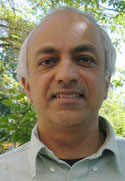 An appeal/invitation has come from Prof. Kalyanakrishnan Shivi Sivaramakrishnan (photo) of Yale University and Vice President of the American Association of Asian Studies (AAS); and Assistant Professor Ramya Sreenivasan of the University of Buffalo and Chair of the South Asia Council of the AAS, for panel proposals for the next two meetings of the AAS from the Swedish South Asian Studies Network. They also seek to encourage more participation from individual members of SASNET. This is part of an effort to boost South Asianist participation at the AAS, since South Asian Studies and scholars from South Asia have often been under-represented at the AAS annual meetings, as well as more European involvement. The next AAS annual meeting will take place in Philadelphia, March 25–28, 2010 (more information), and the 2011 AAS annual meeting will be held in Honolulu, March 31-April 4, 2011. Read the appeal from AAS.
An appeal/invitation has come from Prof. Kalyanakrishnan Shivi Sivaramakrishnan (photo) of Yale University and Vice President of the American Association of Asian Studies (AAS); and Assistant Professor Ramya Sreenivasan of the University of Buffalo and Chair of the South Asia Council of the AAS, for panel proposals for the next two meetings of the AAS from the Swedish South Asian Studies Network. They also seek to encourage more participation from individual members of SASNET. This is part of an effort to boost South Asianist participation at the AAS, since South Asian Studies and scholars from South Asia have often been under-represented at the AAS annual meetings, as well as more European involvement. The next AAS annual meeting will take place in Philadelphia, March 25–28, 2010 (more information), and the 2011 AAS annual meeting will be held in Honolulu, March 31-April 4, 2011. Read the appeal from AAS.
• Karlstad University coordinates Afganistan educational programme
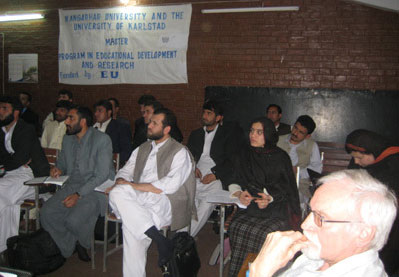 From 1 January 2008, the Dept. of Educational Work, Organisation and Society at Karlstad University coordinates an international educational project, the Masters Programme in Educational Research and Development (MAP). It is an institutional cooperation project between the universities of Karlstad, Sweden; Tampere, Finland; Bochum, Germany; Kathmandu University, Nepal; and Nangarhar University, Jalalabad, Afghanistan. The Swedish Committee for Afghanistan (SCA) is an associate partner in the project. The project is funded since 2007 by an Asia Link Programme
grant from the European Commission, and as the project name implies, the goal is to provide a high-quality Masters Programme in Educational Research and Development at the Nangarhar University in Afghanistan.
Till recently, the project was coordinated by the Institute of International Education (IIE) at Stockholm University, where the groundwork for the project was carried out by Dr. Pia Karlsson, Dr. Amir Mansory and Prof. Holger Daun from 2005.
From 1 January 2008, the Dept. of Educational Work, Organisation and Society at Karlstad University coordinates an international educational project, the Masters Programme in Educational Research and Development (MAP). It is an institutional cooperation project between the universities of Karlstad, Sweden; Tampere, Finland; Bochum, Germany; Kathmandu University, Nepal; and Nangarhar University, Jalalabad, Afghanistan. The Swedish Committee for Afghanistan (SCA) is an associate partner in the project. The project is funded since 2007 by an Asia Link Programme
grant from the European Commission, and as the project name implies, the goal is to provide a high-quality Masters Programme in Educational Research and Development at the Nangarhar University in Afghanistan.
Till recently, the project was coordinated by the Institute of International Education (IIE) at Stockholm University, where the groundwork for the project was carried out by Dr. Pia Karlsson, Dr. Amir Mansory and Prof. Holger Daun from 2005.
MAP was formally inaugurated at the Faculty of Education at Nangarhar University in May 2008.
The programme is unique first of all because it is the first time that an educational training at this level has been implemented in Afghanistan. Secondly, it has a unique study plan, which includes not only theoretical courses but also practical research work in the field. It is also unique because it involves university cooperation between Asia and Europe.
The teaching of courses, and managing the fieldwork, is carried out by a group of teachers from the universities involved. Besides Pia Karlsson, Amir Mansory and Holger Daun from Sweden, the staff also consists of Prof. Christel Adick, holding the Chair of Comparative Education at the University of Bochum; Prof. Mahesh Parajuli, Kathmandu University; and Prof. Tuomas Takala, Dept. of Education, University of Tampere.
Full information about the Masters Programme in Educational Research and Development (MAP) at Nangarhar University.
• Dissertation about Tsunami effects in a Tamil fishing village
 Frida Hastrup, Dept. of Cross-Cultural and Regional Studies, University of Copenhagen, defended her PhD thesis entitled 'Weathering the World – Recovery in the Wake of the Tsunami in a Tamil Fishing Village' on Friday 26 June 2009. The research project has been part of the Tranquebar Initiative of the National Museum of Denmark (more information). In December 2004, the tsunami in the Indian Ocean caused severe damages to Tranquebar in Tamil Nadu, India, killing around 800 people, destroying houses, boats and agricultural land, and leaving high demands for relief aid in the area. The aim of Frida Hastrup’s project has been to analyse the social and cultural effects of the tsunami and the attendant process of reconstruction. The project focuses on the ways in which the social life in Tranquebar (family structures, power relations, education etc.) has been affected, and investigates how changing notions of risk and safety become implicit factors in the process of reconstruction. More information.
Frida Hastrup, Dept. of Cross-Cultural and Regional Studies, University of Copenhagen, defended her PhD thesis entitled 'Weathering the World – Recovery in the Wake of the Tsunami in a Tamil Fishing Village' on Friday 26 June 2009. The research project has been part of the Tranquebar Initiative of the National Museum of Denmark (more information). In December 2004, the tsunami in the Indian Ocean caused severe damages to Tranquebar in Tamil Nadu, India, killing around 800 people, destroying houses, boats and agricultural land, and leaving high demands for relief aid in the area. The aim of Frida Hastrup’s project has been to analyse the social and cultural effects of the tsunami and the attendant process of reconstruction. The project focuses on the ways in which the social life in Tranquebar (family structures, power relations, education etc.) has been affected, and investigates how changing notions of risk and safety become implicit factors in the process of reconstruction. More information.
• Sri Lanka report by Mahinda Kommalage in Lancet
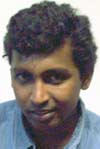 On 11 July 2009, Dr. Mahinda Kommalage who defended his PhD at the Dept. of Neuroscience, Uppsala
University, in 2005, published an article in the international medical journal Lancet. The article, written along with a colleague at the University of Ruhuna, Sri Lanka, where Dr. Kommalage is now working, is entitled ”Sri Lanka: the aftermath”. It is based on their own experiences from the situation on the ground among internally displaced people in Sri Lanka while working in a field clinic in a camp for internally displaced people in May, 2009. The two researchers were members of a voluntary health-care team, among the approximately 171 000 internally displaced people who had fled the conflict zone in northern Sri Lanka during April 2009. Read the article in Lancet (as a pdf-file).
On 11 July 2009, Dr. Mahinda Kommalage who defended his PhD at the Dept. of Neuroscience, Uppsala
University, in 2005, published an article in the international medical journal Lancet. The article, written along with a colleague at the University of Ruhuna, Sri Lanka, where Dr. Kommalage is now working, is entitled ”Sri Lanka: the aftermath”. It is based on their own experiences from the situation on the ground among internally displaced people in Sri Lanka while working in a field clinic in a camp for internally displaced people in May, 2009. The two researchers were members of a voluntary health-care team, among the approximately 171 000 internally displaced people who had fled the conflict zone in northern Sri Lanka during April 2009. Read the article in Lancet (as a pdf-file).
• Bindeshwar Pathak receives the 2009 Stockholm Water Prize
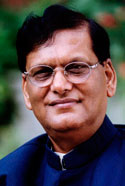 The 2009 Stockholm Water Prize will be awarded to Dr. Bindeshwar Pathak, founder of the Sulabh Sanitation Movement in India. The award ceremony will be held on Thursday 20 August 2009, as part of the World Water Week (more information). Dr. Pathak will also deliver the annual Stockholm Water Prize Laureate lecture at the Opening Plenary Session of the Week. As the founder of the Sulabh International Social Service Organisation, Dr. Pathak is known around the world for his wide ranging work in the sanitation field to improve public health, advance social progress, and improve human rights in India and other countries. His accomplishments span the fields of sanitation technology, social enterprise, and healthcare education for millions of people in his native country, serving as a model for NGO agencies and public health initiatives around the world.
Since he established the Sulabh Sanitation Movement in 1970, Dr. Pathak has worked to change social attitudes toward traditional unsanitary latrine practices in slums, rural villages, and dense urban districts, and developed cost effective toilet systems that have improved daily life and health for millions of people. He has also waged an ongoing campaign to abolish the traditional practice of manual ”scavenging” of human waste from bucket latrines in India while championing the rights of former scavengers and their families to economic opportunity, decent standards of living, and social dignity. More information.
The 2009 Stockholm Water Prize will be awarded to Dr. Bindeshwar Pathak, founder of the Sulabh Sanitation Movement in India. The award ceremony will be held on Thursday 20 August 2009, as part of the World Water Week (more information). Dr. Pathak will also deliver the annual Stockholm Water Prize Laureate lecture at the Opening Plenary Session of the Week. As the founder of the Sulabh International Social Service Organisation, Dr. Pathak is known around the world for his wide ranging work in the sanitation field to improve public health, advance social progress, and improve human rights in India and other countries. His accomplishments span the fields of sanitation technology, social enterprise, and healthcare education for millions of people in his native country, serving as a model for NGO agencies and public health initiatives around the world.
Since he established the Sulabh Sanitation Movement in 1970, Dr. Pathak has worked to change social attitudes toward traditional unsanitary latrine practices in slums, rural villages, and dense urban districts, and developed cost effective toilet systems that have improved daily life and health for millions of people. He has also waged an ongoing campaign to abolish the traditional practice of manual ”scavenging” of human waste from bucket latrines in India while championing the rights of former scavengers and their families to economic opportunity, decent standards of living, and social dignity. More information.
• PIPS publishes Journal of Conflict and Peace Studies
PIPS Journal of Conflict and Peace Studies is a new quarterly research dissemination by the Pakistan Institute for Peace Studies (PIPS), Islamabad, in its key mandated areas. The research journal is published quarterly and provides a forum for those around the world undertaking research in the areas of:
• Conflict and peace (Inter-state and Intra-state conflicts in South Asia); • Security and development;
• Radicalization;
• Media for peace and democracy;
• Political violence and terrorism;
• Counter terrorism; • Economic strategic issues; and • International relations and foreign policy.
PIPS Journal of Conflict and Peace Studies is a primary scholarly journal in its area. Dr. Catarina
Kinnvall, Dept. of Political Science, and member of SASNET’s board, belongs to its advisory board. The magazine publishes broadly on issues of conflict and violence. Presently, it focuses on radicalization and talibanization. More information at its web page.
• Petra Bergquist reports from internship work at CREST
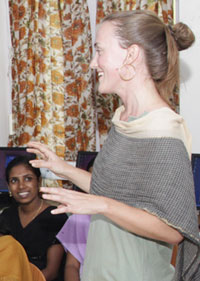 In May 2009, the Swedish Masters student Petra Bergquist was selected for Internship at the Centre for Research and Education for Social Transformation (CREST) in Kozhikode, India. CREST is an autonomous institution under the Government of Kerala that is
involved with research and educational programmes for marginalized communities. Petra spends three months at CREST, working with a group of 40 graduates from Dalit/Adivasi and other minority communities of Kerala who are taking a Post Graduate
Certificate Course for Professional Development. The main aim of the internship is learning by teaching through an exchange of experiences and ideas. The students come from various disciplinary backgrounds including natural sciences as well as social sciences and history. During Petra’s 3 months stay at CREST she conducts lectures focusing on women and development, arranges daily afternoon sessions on general knowledge, and supports students in their communication skills. Read her report from the internship.
In May 2009, the Swedish Masters student Petra Bergquist was selected for Internship at the Centre for Research and Education for Social Transformation (CREST) in Kozhikode, India. CREST is an autonomous institution under the Government of Kerala that is
involved with research and educational programmes for marginalized communities. Petra spends three months at CREST, working with a group of 40 graduates from Dalit/Adivasi and other minority communities of Kerala who are taking a Post Graduate
Certificate Course for Professional Development. The main aim of the internship is learning by teaching through an exchange of experiences and ideas. The students come from various disciplinary backgrounds including natural sciences as well as social sciences and history. During Petra’s 3 months stay at CREST she conducts lectures focusing on women and development, arranges daily afternoon sessions on general knowledge, and supports students in their communication skills. Read her report from the internship.
– Internship opportunities are now again offered to Swedish students, to work at CREST during the Fall 2009. International /local travel expenses should be met by the candidates. The Interns will be based in Kozhikode (Calicut), Kerala. A monthly living allowance of Rs.6000/- (approximately 120 USD) will be given to the interns. During the internship, the candidates will stay for free at CREST student hostel in Calicut. Interns should meet the expenses for food. The application deadline is Tuesday 25 August 2009. The internship will begin from mid-October 2009. Full information.
• Short-term scholarships for PhD students at Roskilde University
The Graduate School of International Development Studies (IDS) at Roskilde University, Denmark announces a limited number of short-term scholarships intended for PhD students already engaged in a formal PhD study programme, but who would be interested in pursuing part of their programme with IDS, Roskilde. The scholarship is intended to students in the post-fieldwork phase of their research. A certain preference will be given to students from the developing world. Four guest scholarships are available for PhD students for a period ranging from 3 to 5 months.
The scholarships are available starting February 2010 or soonest thereafter. Applications should be received no later than September 14th, 2009. More information.
• Yale announces for Assistant Professor in South Asian anthropology
 The Dept. of Anthropology, Yale University, Connecticut, USA, anticipates making a tenure-track appointment in South Asian anthropology at the starting assistant professor level, beginning on July 1, 2010. Applicants are wanted with demonstrated commitment to field research whose interests will complement existing Departmental strengths. The appointment is sponsored by the Council on South Asian Studies of the MacMillan Center, and the successful candidate will be expected to maintain teaching offerings and research interests that contribute to the Council’s programs. Applications should include a curriculum vitae and statement of research and teaching interests. Review of applications will begin on September 1, 2009.
The Dept. of Anthropology, Yale University, Connecticut, USA, anticipates making a tenure-track appointment in South Asian anthropology at the starting assistant professor level, beginning on July 1, 2010. Applicants are wanted with demonstrated commitment to field research whose interests will complement existing Departmental strengths. The appointment is sponsored by the Council on South Asian Studies of the MacMillan Center, and the successful candidate will be expected to maintain teaching offerings and research interests that contribute to the Council’s programs. Applications should include a curriculum vitae and statement of research and teaching interests. Review of applications will begin on September 1, 2009.
• National University of Singapore announces Research Fellowships
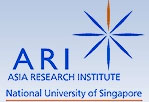 Applications are invited for (Senior) Research Fellowships, One-Year Visiting (Senior) Research Fellowships and Postdoctoral Fellowships at the Asia Research Institute (ARI) of the National University of Singapore (NUS) for commencement between April 2010 and September 2010.
The positions are intended for outstanding active researchers from around the world, to work on an important piece of research in the social sciences and humanities. Interdisciplinary interests are encouraged. Up to three months of a 12-month fellowship may be spent conducting fieldwork in the Asian region.
A majority of the positions will be allocated to some specific areas: • Asian Migration; • Changing Family in Asia; • Cultural Studies in Asia; • Religion and Globalisation in Asian Contexts; • Science, Technology, and Society; • Sustainable Cities; and an Open Category – open to talented people with
exciting ideas and worthwhile projects whose interests may not immediately fit one of the categories.
The Asia Research Institute (ARI) was established as a university-level institute in 2001 with a mission to provide a world-class focus and resource for research on the Asian region, located at one of its communication hubs.
ARI engages the humanities and social sciences broadly defined, and especially interdisciplinary frontiers between and beyond disciplines. Closing date for applications is 1 October 2009.
Applications are invited for (Senior) Research Fellowships, One-Year Visiting (Senior) Research Fellowships and Postdoctoral Fellowships at the Asia Research Institute (ARI) of the National University of Singapore (NUS) for commencement between April 2010 and September 2010.
The positions are intended for outstanding active researchers from around the world, to work on an important piece of research in the social sciences and humanities. Interdisciplinary interests are encouraged. Up to three months of a 12-month fellowship may be spent conducting fieldwork in the Asian region.
A majority of the positions will be allocated to some specific areas: • Asian Migration; • Changing Family in Asia; • Cultural Studies in Asia; • Religion and Globalisation in Asian Contexts; • Science, Technology, and Society; • Sustainable Cities; and an Open Category – open to talented people with
exciting ideas and worthwhile projects whose interests may not immediately fit one of the categories.
The Asia Research Institute (ARI) was established as a university-level institute in 2001 with a mission to provide a world-class focus and resource for research on the Asian region, located at one of its communication hubs.
ARI engages the humanities and social sciences broadly defined, and especially interdisciplinary frontiers between and beyond disciplines. Closing date for applications is 1 October 2009.
• South Asianist wanted as Anthropology Professor in Tübingen
The Institute of Asian and Oriental Studies in the Faculty of Cultural Studies at Tübingen University, Germany, invites applications for the position of Professor for Social and Cultural Anthropology. The applicant should be specialised on South Asia, in particular India, and be acquainted with a broad spectrum of anthropological research and teaching. The position is due to commence on the 1st October 2010. The closing date for applications is 30 September 2009.
• University of Pennylvania announces for Assistant Director
The South Asia Center at the University of Pennsylvania is seeking a full-time Assistant Director. The Assistant Director works with the South Asia Center Associate Director and Center Director, organizing and coordinating events, lectures, film series, and other programs. BA/BS degree required, Master’s preferred; minimum 3 years of related experience or an equivalent combination of education & experience. When applying, use reference number 090626761.
• More information about South Asia related
research at Swedish and Nordic universities
See SASNET’s page, http://www.sasnet.lu.se/research.html
• Information about South Asia related
education at Swedish and Nordic universities
See SASNET’s page, http://www.sasnet.lu.se/education.html
• 16th IUAES conference held in Kunming
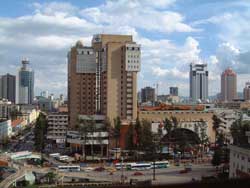 The 16th International Union of Anthropological and Ethnological Sciences (IUAES) will be held 27–31 July 2009 in Kunming, Yunnan, China. The conference (that originally should have been held a year ago, in July 2008) has the overall theme ”Humanity, Development and Diversity” and includes several panels involving researchers from South Asia. Full information about the IUAES conference.
The 16th International Union of Anthropological and Ethnological Sciences (IUAES) will be held 27–31 July 2009 in Kunming, Yunnan, China. The conference (that originally should have been held a year ago, in July 2008) has the overall theme ”Humanity, Development and Diversity” and includes several panels involving researchers from South Asia. Full information about the IUAES conference.
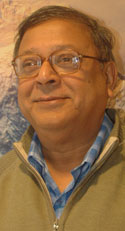 – A panel entitled ”Pilgrimage Landscape, Cosmogram and Planning the Heritage Cities” is organised by Prof. Rana P. B. Singh (photo to the left), Banaras Hindu University, India and Prof. Masaaki Fukunaga, Centre for South Asian Studies, Gifu Women’s University, Japan. Read their call for papers.
– A panel entitled ”Pilgrimage Landscape, Cosmogram and Planning the Heritage Cities” is organised by Prof. Rana P. B. Singh (photo to the left), Banaras Hindu University, India and Prof. Masaaki Fukunaga, Centre for South Asian Studies, Gifu Women’s University, Japan. Read their call for papers.
– Other South Asia related panels at the Kunming conference include a panel on ”Female Child Migration and Trafficking in Asia”, organised by Vijay Prakash Sharma, Advisor of USAID/India – REFORM Project; a panel on ”Diverse Ethnic Rites of Passage”, organised by Associate Professor Zulfiquar Ali Islam, Dept. of Sociology, University of Rajshahi, Bangladesh, and Associate Professor Md Mustafa Kamal Akand from the Dept. of Anthropology at the same university; and a panel on ”Feminization of Ageing And Gender Issues: Asia Region” organised by Prof. Amrita Bagga, Dept. of Anthropology, University of Pune, India. More information.
• Carol Genetti keynote speaker at 15th Himalayan Languages Symposium
 The 15th Himalayan Languages Symposium
will be held at the University of Oregon in
Eugene, USA
31 July – 1 August 2009.
The Himalayan Languages Symposium is an annually convening, open scholarly forum for scholars of Himalayan languages. It serves as a podium for contributions on any language of the greater Himalayan region, whether Burushaski, Kusunda, a Tibeto-Burman language, an Indo-Aryan tongue or other language. Linguists as well as specialists from related disciplines like philology, history, anthropology, archaeology and prehistory are welcome to make their contributions to the study of Himalayan languages and Himalayan language communities.
The keynote speaker will be
Dr. Carol Genetti, University of California Santa Barbara, who will talk about ”An introduction to Dzala, an East-Bodish language of eastern Bhutan”. More information.
The 15th Himalayan Languages Symposium
will be held at the University of Oregon in
Eugene, USA
31 July – 1 August 2009.
The Himalayan Languages Symposium is an annually convening, open scholarly forum for scholars of Himalayan languages. It serves as a podium for contributions on any language of the greater Himalayan region, whether Burushaski, Kusunda, a Tibeto-Burman language, an Indo-Aryan tongue or other language. Linguists as well as specialists from related disciplines like philology, history, anthropology, archaeology and prehistory are welcome to make their contributions to the study of Himalayan languages and Himalayan language communities.
The keynote speaker will be
Dr. Carol Genetti, University of California Santa Barbara, who will talk about ”An introduction to Dzala, an East-Bodish language of eastern Bhutan”. More information.
• 6th International Convention of Asia Scholars in Daejon
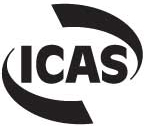 The 6th International Convention of Asia Scholars (ICAS6) will be held in Daejon, South Korea, 14–17 August 2009. It will be hosted by the Chungnam National University (CNU), the
Center for Asian Regional Studies (CARS) and Daejeon Metropolitan City. The
overarching theme will be ”Think Asia!”. More than 1,500 Asia Studies
specialists in the fields of the Human and Natural Sciences from all over the world are expected to participate. For the third time the ICAS Book Prizes will also be awarded during the convention, in the categories: Humanities, Social Sciences, Best PhD and Colleagues’ Choice Award. More information.
The 6th International Convention of Asia Scholars (ICAS6) will be held in Daejon, South Korea, 14–17 August 2009. It will be hosted by the Chungnam National University (CNU), the
Center for Asian Regional Studies (CARS) and Daejeon Metropolitan City. The
overarching theme will be ”Think Asia!”. More than 1,500 Asia Studies
specialists in the fields of the Human and Natural Sciences from all over the world are expected to participate. For the third time the ICAS Book Prizes will also be awarded during the convention, in the categories: Humanities, Social Sciences, Best PhD and Colleagues’ Choice Award. More information.
• 2009 World Water Week in Stockholm
 The 2009 World Water Week in Stockholm will be held 16–22 August 2009. The theme for 2009 is ”Water – Responding to Global Change: Accessing Water for the Common Good with Special Focus on Transboundary Waters”. The World Water Week, organised by the Stockholm International Water Institute (SIWI) is
the leading annual global meeting place for capacity-building,
partnership-building and follow-up on the implementation of international
processes and programmes in water and development, with large relevance
to South Asia. It is filled with plenary sessions, seminars, workshops,
side events and special activities. The Scientific Programme Committee (SPC) planning for the conference is chaired by Prof. Jan Lundqvist, Dept. of Water and Environmental Studies, Linköping University. Registrations are now open. Discounted Registration ends June 30, 2009. Venue: Stockholm
International Fairs and Congress Center (Stockholmsmässan) in Älvsjö, 9 km south of central Stockholm. Download the Second Announcement and learn more about the 2009 World Water Week.
The 2009 World Water Week in Stockholm will be held 16–22 August 2009. The theme for 2009 is ”Water – Responding to Global Change: Accessing Water for the Common Good with Special Focus on Transboundary Waters”. The World Water Week, organised by the Stockholm International Water Institute (SIWI) is
the leading annual global meeting place for capacity-building,
partnership-building and follow-up on the implementation of international
processes and programmes in water and development, with large relevance
to South Asia. It is filled with plenary sessions, seminars, workshops,
side events and special activities. The Scientific Programme Committee (SPC) planning for the conference is chaired by Prof. Jan Lundqvist, Dept. of Water and Environmental Studies, Linköping University. Registrations are now open. Discounted Registration ends June 30, 2009. Venue: Stockholm
International Fairs and Congress Center (Stockholmsmässan) in Älvsjö, 9 km south of central Stockholm. Download the Second Announcement and learn more about the 2009 World Water Week.
• Sri Lanka Conference on Peace and Development in Kandy
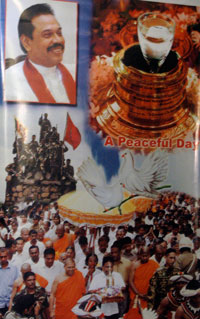 The Sri Lanka Conference on Peace and Development will be held in Kandy, Sri Lanka, 23–25 August 2009. The conference is jointly organized by the International Centre for Ethnic Studies (ICES), Colombo, and the University of Peradeniya in Sri Lanka, in collaboration with the School of Global Studies, University of Gothenburg and the Dept. of Peace and Conflict Research, Uppsala University, Sweden. It is being funded by a conference grant provided to Prof. Michael Schulz, Department of Peace and Development Research (PADRIGU), School of Global Studies, University of Gothenburg by SASNET in 2008. The aim of the first Sri Lanka conference on Peace and Development issues is to bring together and initiate a process of dialogue among local and international researchers, doctoral students, who study about peace and development issues in Sri Lanka and practitioners of peace and development. The practitioners are professionals engaged in peace and development through working in INGOs, NGOs, and government institutions. The participants of this conference will present their practical experience, research findings, ongoing research projects and research proposals. This conference lays a heavy emphasis on the potential for reconstruction, reconciliation and development prospects in the war affected regions of Sri Lanka. Sub-themes include issues such as – Peace processes, peace building and peace making; failures and future prospects; – Poverty, vulnerability and conflict; – Social reconstruction and reconciliation; and – Social and psychological care for the victims of violence. The conference will host 30-40 participants. The conference papers will be peer-reviewed. Venue: Tourmaline Hotel, Kandy.
The Sri Lanka Conference on Peace and Development will be held in Kandy, Sri Lanka, 23–25 August 2009. The conference is jointly organized by the International Centre for Ethnic Studies (ICES), Colombo, and the University of Peradeniya in Sri Lanka, in collaboration with the School of Global Studies, University of Gothenburg and the Dept. of Peace and Conflict Research, Uppsala University, Sweden. It is being funded by a conference grant provided to Prof. Michael Schulz, Department of Peace and Development Research (PADRIGU), School of Global Studies, University of Gothenburg by SASNET in 2008. The aim of the first Sri Lanka conference on Peace and Development issues is to bring together and initiate a process of dialogue among local and international researchers, doctoral students, who study about peace and development issues in Sri Lanka and practitioners of peace and development. The practitioners are professionals engaged in peace and development through working in INGOs, NGOs, and government institutions. The participants of this conference will present their practical experience, research findings, ongoing research projects and research proposals. This conference lays a heavy emphasis on the potential for reconstruction, reconciliation and development prospects in the war affected regions of Sri Lanka. Sub-themes include issues such as – Peace processes, peace building and peace making; failures and future prospects; – Poverty, vulnerability and conflict; – Social reconstruction and reconciliation; and – Social and psychological care for the victims of violence. The conference will host 30-40 participants. The conference papers will be peer-reviewed. Venue: Tourmaline Hotel, Kandy.
Full information about the conference.
• Zurich conference on Asia-Europe research perspectives
 An international conference on ”Varieties of Modernity? Possibilities and limitations of a research perspective for Asia and Europe” will be held in Zurich, Switzerland, 8–10 September 2009. It is organised by the University Priority Research Programme ”Asia and Europe” of the University of Zurich.
The conference will critically address the widely used concept of multiple modernities in the specific context of Asia and Europe. Countries of the Eurasian continent have been involved in manifold processes of mutual appropriation and demarcation since the beginning of history. It will bring together proponents and critics of the concept of multiple modernities and seeks to subject the intensive debates on the topic in sociology to an interdisciplinary view. One of the keynote addresses will be given by Prof. Sanjay Subrahmanyam from the University of Calfornia in Los Angeles (UCLA). Conference venue: Park-Villa Rieter, Museum Rietberg, Gablerstrasse 15, Zürich. More information.
An international conference on ”Varieties of Modernity? Possibilities and limitations of a research perspective for Asia and Europe” will be held in Zurich, Switzerland, 8–10 September 2009. It is organised by the University Priority Research Programme ”Asia and Europe” of the University of Zurich.
The conference will critically address the widely used concept of multiple modernities in the specific context of Asia and Europe. Countries of the Eurasian continent have been involved in manifold processes of mutual appropriation and demarcation since the beginning of history. It will bring together proponents and critics of the concept of multiple modernities and seeks to subject the intensive debates on the topic in sociology to an interdisciplinary view. One of the keynote addresses will be given by Prof. Sanjay Subrahmanyam from the University of Calfornia in Los Angeles (UCLA). Conference venue: Park-Villa Rieter, Museum Rietberg, Gablerstrasse 15, Zürich. More information.
• New Delhi workshop on Livelihoods and the Environment
An International Workshop on ”Livelihoods and the Environment:
Debating inter disciplinary perspectives” will be held in New Delhi, India, 16–17 October 2009. It is jointly organized by CSSP/Jawaharlal Nehru University (JNU), the Dept. of History/University of Delhi, and the Dept. of History/Uppsala University. The workshop convenors are
Dr. Mahesh Rangarajan, Delhi University,
Dr. Gunnel Cederlöf, Uppsala University, and
Dr. Rohan D'Souza, JNU. The workshop aims at bringing together some of the new and exciting work in the field, especially from Sweden and India. The emphasis will be on enabling a dialogue across disciplines, with a special accent on reviewing ongoing work by younger scholars. The idea is to offer a
platform for thought, reflection, debate and dialogue for an understanding of the linked challenges of nature, knowledge, ecology and academic enquiry. Swedish confirmed participants are Dr. Katrin Uba, Dept. of Government, Uppsala University, Dr. Seema Arora Jonsson, and Sriskandarajah, both from the Dept. of Rural and Urban Development, Swedish University of Agricultural Sciences (SLU), Uppsala, and Dr. Beppe Karlsson, Dept. of Cultural Anthropology and Ethnology, Uppsala University. Deadline for registration is Monday 17 August for participants who will present papers. Other participants should register before 17 September.
Venue: Jawaharlal Nehru University (JNU), New Delhi.
• Third annual SIETAR India conference to be held in Pune
The third annual SIETAR India conference will be held in Pune, Maharashtra, 31 October–1 November 2009. The 2009 SIETAR (Society for Intercultural Education, Training and Research) conference has the theme ”Connecting Worlds: Solutions through Intercultural Insights”, and will include an Education Panel focusing on ”Increased global mobility: Our Learners’ Readiness for the globalised world”. SIETAR India is a non-profit
association of educators, researchers and trainers from a wide range of practical and academic
disciplines who share a common concern for intercultural relations. Former President of India, Dr. Abdul Kalam, is supposed to be the keynote speaker. Venue: The Orchid School, Baner Mahalunge Road, Pune. More information.
• Malda conference on Political Economy, Nation, Development and Environment
An international conference on ”Political Economy, Nation, Development and Environment: A Historical Perspective of India between 1707 and 1960” will be held in Malda, West Bengal, India, 11–12 January 2010. The conference will be organised by the Post-Graduate Department of History at Malda College, and is convened by Mr. Ashim Sarkar, and Dr. Kaushik Chakraborty. The aim is to reach at a deeper understanding of the history of the subcontinent with special reference to Northern Bengal in order to critically assess the development agenda of the Post-Colonial state which originated in 1947.
Last date for submission of abstracts is 31 August 2009. More information.
• Time to propose panels for 2010 AAS conference in Philadelphia
 The 2010 Association for Asian Studies (AAS) Conference will be held in Philadelphia, Pennsylvania, USA, on 25–28 March 2010. Deadline for all proposals is Friday 7 August 2009. All proposals must be sent in electronically through the AAS website. AAS seeks to expand coverage of contemporary, social science, and policy-oriented issues in its 2010 meeting with a critical mass of 50 high-profile panels. The number of panels at the previous Chicago meeting was increased to 249, and the organisers now plan for a similar total in Philadelphia. This should offer sufficient scope to expand the number of panels in currently underrepresented areas such as political science, sociology, economics, law, geography, and business. Venue: Philadelphia Marriott Downtown Hotel. More information.
The 2010 Association for Asian Studies (AAS) Conference will be held in Philadelphia, Pennsylvania, USA, on 25–28 March 2010. Deadline for all proposals is Friday 7 August 2009. All proposals must be sent in electronically through the AAS website. AAS seeks to expand coverage of contemporary, social science, and policy-oriented issues in its 2010 meeting with a critical mass of 50 high-profile panels. The number of panels at the previous Chicago meeting was increased to 249, and the organisers now plan for a similar total in Philadelphia. This should offer sufficient scope to expand the number of panels in currently underrepresented areas such as political science, sociology, economics, law, geography, and business. Venue: Philadelphia Marriott Downtown Hotel. More information.
The Fifth Annual Tamil Studies Conference (TSC) will be held at the University of Toronto, Canada, on 13–15 May 2010. The theme for the TSC 2010 conference will be ”Constructing Tamil Worlds: Circulation, Marginality and Plurality”. The plenary speakers are Sanjay Subrahmanyam from the University of California, Los Angeles, and Raj Gauthaman from the Post Graduate Centre in Pondicherry, India. The conference organizers invite papers that examine, from different disciplinary perspectives, the Tamil regions, worlds, world views and practices as a product of circulation rather than permanence. Constant movement, across time and space, has played an important role in both establishing and destabilizing notions of culture and identity. Submission of an abstract and biographical statement, or the full details of a panel should be given by 31 August 31 2009. More information.
• Other conferences connected to South Asian
studies arranged all over the World
See SASNET’s page, http://www.sasnet.lu.se/conferences.html#conf
Important lectures and seminars in Scandinavia
• Meera Nanda keynote speaker at second ADI conference in Copenhagen
 The Asian Dynamics Initiative at the University of Copenhagen will organize a conference, open to the public, on the topic ‘The Soft Power Impact of Asia’ on Monday 17 September 2009, 13.30–17.30. The purpose of the event is to celebrate the one-year anniversary of the Asian Dynamics Initiative (ADI). ADI is a cross-faculty and interdisciplinary effort to meet the current challenges and demands for better knowledge of and deeper insights into Asian matters. The Steering Committee of ADI has decided to mark the day with an academic event with international speakers and a broad appeal. Soft power and soft power impact are topics that attract growing interest, also in academic circles. The ADI Conference will bring together four international experts, who in various ways will address the overall topic ‘Soft Power Impact of Asia'. In their keynote speeches they will touch upon a wide range of subjects from popular culture – manga and anime to Hinduism, diplomacy and global financial crisis. South Asia will be represented by Dr. Meera Nanda from Jawaharlal Nehru University (JNU) in New Delhi, India who will speak about
'Hindu triumphalism and India's emergence as a global power'. Venue: University of Copenhagen, The Ceremonial Hall, Frue Plads, Copenhagen. More information.
The Asian Dynamics Initiative at the University of Copenhagen will organize a conference, open to the public, on the topic ‘The Soft Power Impact of Asia’ on Monday 17 September 2009, 13.30–17.30. The purpose of the event is to celebrate the one-year anniversary of the Asian Dynamics Initiative (ADI). ADI is a cross-faculty and interdisciplinary effort to meet the current challenges and demands for better knowledge of and deeper insights into Asian matters. The Steering Committee of ADI has decided to mark the day with an academic event with international speakers and a broad appeal. Soft power and soft power impact are topics that attract growing interest, also in academic circles. The ADI Conference will bring together four international experts, who in various ways will address the overall topic ‘Soft Power Impact of Asia'. In their keynote speeches they will touch upon a wide range of subjects from popular culture – manga and anime to Hinduism, diplomacy and global financial crisis. South Asia will be represented by Dr. Meera Nanda from Jawaharlal Nehru University (JNU) in New Delhi, India who will speak about
'Hindu triumphalism and India's emergence as a global power'. Venue: University of Copenhagen, The Ceremonial Hall, Frue Plads, Copenhagen. More information.
• Oslo seminar on current themes in Indian society
A one-day seminar on ”India today” will be held at the University of Oslo on Tuesday 29 September 2009. The seminar is jointly organised by the Centre for Development and the Environment (SUM); the Department of Culture Studies and Oriental Languages (IKOS); and the Norwegian Asia Network (Asianettverket). The seminar will focus on current themes in Indian society, and it is a follow-up to a seminar entitled ”Emerging India: Challenges and Prospects” (more information) that was organised by the University of Oslo in March 2007. Some of the participants from that seminar have been asked to come back and give updated perspectives based on their research, but they will be joined by a number of other new researchers from Norway, Denmark and Sweden. The seminar is convened by Kenneth Nielsen, a social anthropologist currently working on a PhD project entitled ”In Defence of the Land: Rural Social Movements and Urban Activists in India’s West Bengal”. More information (in Norwegian only).
Business and Politics
• Swedish Embassy in Colombo closes down
On Thursday 23 July 2009, the Swedish Government decided to close down its embassy in Colombo, Sri Lanka. It also decided to close down four consulates-general worldwide, in Kaliningrad, Russian Federation; Guangzhou, China; Los Angeles, and New York, USA. Alongside the changes in the Foreign Service, the number of staff is to be reduced by 100 over the period 2008-2010 and the Foreign Service's property costs are to be reduced by SEK 50 million.
The closure of the Embassy in Colombo is to be completed by 31 March 2010 at the latest. In connection with the Government‚s review of development cooperation in 2007 a decision was made to end Sweden’s bilateral development assistance to Sri Lanka. Existing development cooperation agreements will be seen through to their conclusion. The aim is to be able to open an honorary consulate that, in cooperation with the Embassy in New Delhi, can provide service to Swedish citizens and companies. Visa services will be managed within the framework of Schengen cooperation. More information.
• New Swedish aid strategy for Afghanistan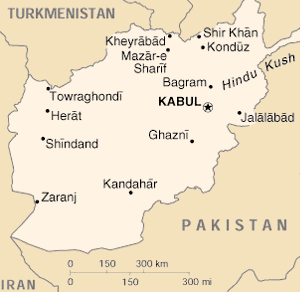
On Thursday 9 July 2009 the Swedish Government adopted a new long-term strategy for Swedish aid to Afghanistan. Under the strategy, which covers the period to 2013, Swedish aid to Afghanistan will increase gradually to about SEK 500 million per year. The Government's decision instructs Sida to pay particular attention to democracy and human rights, the education sector and the fostering of better conditions for small enterprise. Under the new strategy, Swedish development cooperation in Afghanistan will focus on democracy and human rights, the education sector and business sector development in the coming strategy period of almost five years. In every case, use will be made of the opportunities to take special action to improve the situation of women and girls in the country. An initiative is also expected to enhance domestic civilian capacity in various key areas, such as the legal sector and the security sector in Afghanistan. To create synergies with other Swedish action, about a quarter of Sida funding will be used in the four provinces in northern Afghanistan where Sweden is leading a Provincial Reconstruction Team (PRT) as part of the International Security Assistance Force (ISAF) and has police officers in place as part of the European Union Police Mission (EUPOL). To reinforce this aid initiative in northern Afghanistan, the Government has already decided to increase the number of civilian advisers in the PRT. More information.
• Information about South Asia related business and politics in Sweden
See SASNET's page, http://www.sasnet.lu.se/polbuss.html
South Asia related culture in Scandinavia
• Atiq Rahimi participates in 25th Gothenburg Book Fair
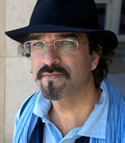 The 25th annual Göteborg International Book and Library Fair will be held 24–27 September 2009. The 2009 seminar programme includes 442 seminars, and an impressive 785 participants from 25 countries will join in the seminars, talks and discussions. There is however only a limited number of South Asia related events this year. The Afghani writer Atiq Rahimi (photo) will participate. During the war in Afghanistan, Rahimi lived as a refugee in France, but has now returned to Kabul to work as a creative advisor to the country’s leading media company. His first book Earth and Ashes was published in 2000, and was later turned into a movie. Now his recent book, that won the French Prix Goncourt 2008, has been translated into Swedish and published by Leopard publishing house with the title Tålamodets sten. More information.
The 25th annual Göteborg International Book and Library Fair will be held 24–27 September 2009. The 2009 seminar programme includes 442 seminars, and an impressive 785 participants from 25 countries will join in the seminars, talks and discussions. There is however only a limited number of South Asia related events this year. The Afghani writer Atiq Rahimi (photo) will participate. During the war in Afghanistan, Rahimi lived as a refugee in France, but has now returned to Kabul to work as a creative advisor to the country’s leading media company. His first book Earth and Ashes was published in 2000, and was later turned into a movie. Now his recent book, that won the French Prix Goncourt 2008, has been translated into Swedish and published by Leopard publishing house with the title Tålamodets sten. More information.
• Indian Library presents volume with Indian poetry translated into Swedish
 The Indo-Swedish Translation Project/Indian Library will also be represented at the 2009 Book Fair, to present its latest volume of Indian literature translated into Swedish. This time an anthology with current Indian poetry. It has been edited by Birgitta Wallin from Karavan magazine, and published by Tranan publishing house. A seminar, entitled ”Indiska versfötters väg till Sverige”, will be jointly organised on Friday 25 September by Indian Library, Tranan and Karavan. The Indian poet Anjum Hasan, and the Swedish poet Marie Lundquist, will discuss the poems in the book, and also the workshop that preceded the publication of the book. This workshop was held in January 2009 in Calangute, Goa, India, and involved poets from both India and Sweden, including K. Satchidanandan, former Secretary of Sahitya Akademi. During workshop sessions, they translated Indian poetry from different languages into Swedish. More information.
The Indo-Swedish Translation Project/Indian Library will also be represented at the 2009 Book Fair, to present its latest volume of Indian literature translated into Swedish. This time an anthology with current Indian poetry. It has been edited by Birgitta Wallin from Karavan magazine, and published by Tranan publishing house. A seminar, entitled ”Indiska versfötters väg till Sverige”, will be jointly organised on Friday 25 September by Indian Library, Tranan and Karavan. The Indian poet Anjum Hasan, and the Swedish poet Marie Lundquist, will discuss the poems in the book, and also the workshop that preceded the publication of the book. This workshop was held in January 2009 in Calangute, Goa, India, and involved poets from both India and Sweden, including K. Satchidanandan, former Secretary of Sahitya Akademi. During workshop sessions, they translated Indian poetry from different languages into Swedish. More information.
• Ustad Ali Akbar Khan passed away
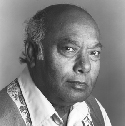 Ustad Ali Akbar Khan, who took Indian classical music to the West along with sitar maestro Ravi Shankar, died in San Francisco on Friday, June 19, 2009. Born on April 14, 1922 at Shivpur in then undivided Bengal, Ali Akbar Khan was the only son of Ustad Alauddin Khan, one of India’s greatest musicians. He grew up in the princely state of Maihar under the watchful eyes of his father, a strict disciplinarian. Complete article here.
Ustad Ali Akbar Khan, who took Indian classical music to the West along with sitar maestro Ravi Shankar, died in San Francisco on Friday, June 19, 2009. Born on April 14, 1922 at Shivpur in then undivided Bengal, Ali Akbar Khan was the only son of Ustad Alauddin Khan, one of India’s greatest musicians. He grew up in the princely state of Maihar under the watchful eyes of his father, a strict disciplinarian. Complete article here.
• Bollywood exhibition in Gothenburg lasts whole summer
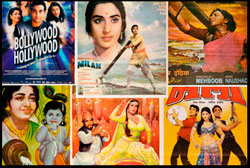 The exhibition "BOLLYWOOD”, is now shown at the Museum of World Cultures in Gothenburg. The exhibition, previously shown at the Museum of Far Eastern Antiquities (Östasiatiska
Museet) in Stockholm, takes off in Indian films and shows how contemporary India is connected
to its past through stories and myths about love, gods and heroes. What is Bollywood? Why has it become so fantastically popular? Who are the world's most popular movie stars, really? The exhibition is entrance free and continues until 27 September 2009. During this period many programmes with film shows, dance performances and lectures are organised.
In the exhibition, produced by the Museum of World Culture in cooperation with the Museum of Far Eastern Antiquities and the Helsinki City Art Museum in Finland, the entire family may enjoy experiences from a world that still seems to be far from our daily lives. Or is that really so? In the Bollywood exhibition, the audience can try to be a singing star, record their own Bollywood film and dance in great dance scenes from popular Bollywood movies. The exhibition discusses what Bollywood as a cultural expression actually consists of and how such a massive success can affect your world view. Venue: Världskulturmuseet, Södra Vägen 54, Göteborg. More
information.
The exhibition "BOLLYWOOD”, is now shown at the Museum of World Cultures in Gothenburg. The exhibition, previously shown at the Museum of Far Eastern Antiquities (Östasiatiska
Museet) in Stockholm, takes off in Indian films and shows how contemporary India is connected
to its past through stories and myths about love, gods and heroes. What is Bollywood? Why has it become so fantastically popular? Who are the world's most popular movie stars, really? The exhibition is entrance free and continues until 27 September 2009. During this period many programmes with film shows, dance performances and lectures are organised.
In the exhibition, produced by the Museum of World Culture in cooperation with the Museum of Far Eastern Antiquities and the Helsinki City Art Museum in Finland, the entire family may enjoy experiences from a world that still seems to be far from our daily lives. Or is that really so? In the Bollywood exhibition, the audience can try to be a singing star, record their own Bollywood film and dance in great dance scenes from popular Bollywood movies. The exhibition discusses what Bollywood as a cultural expression actually consists of and how such a massive success can affect your world view. Venue: Världskulturmuseet, Södra Vägen 54, Göteborg. More
information.
• Tibetan Cham dance at the Bollywood cinema hall in Malmö
A performance of Tibetan Cham dance by artists from the Gyudmed Monastery in South India will take place in Malmö on Tuesday 8 September 2009, 18–21. The concert is organised by BioCentrum, the Bollywood cinema hall, at Järnvägsgatan 28 in Limhamn. More information.
• More information about South Asia related culture
in Sweden and Scandinavia
See SASNET’s page, http://www.sasnet.lu.se/culture.html
New and updated items on SASNET web site
• Swedish departments where research on
South Asia is going on:
Constantly added to the list of research environments at Swedish
universities, presented by SASNET. The full list now includes 254 departments,
with detailed descriptions of the South Asia related research and education
taking place! Go to http://www.sasnet.lu.se/environment.html
ƒ Educational Work, Organisation and Society, Faculty of Arts and Education, Karlstad University
• Useful travelling information
Look at http://www.sasnet.lu.se/travelling.html.
Updated travel advises from the The British Foreign & Commonwealth
Office about safety aspects on travelling to the countries of
South Asia.
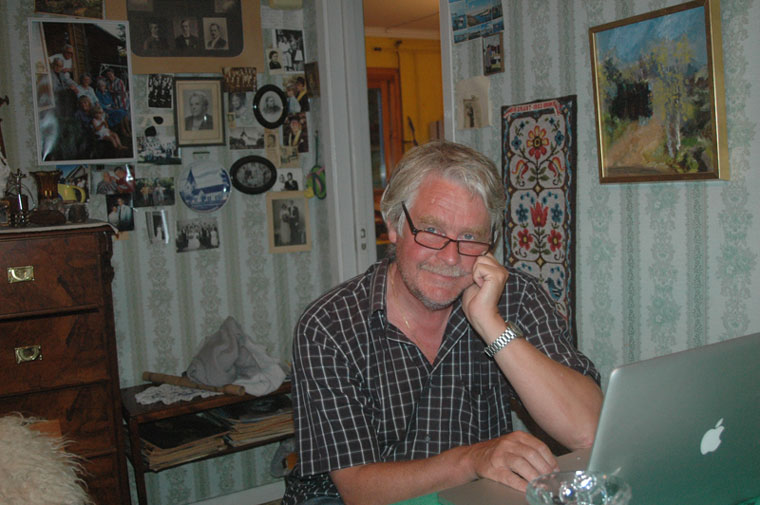
Best regards,
Lars Eklund
deputy director/webmaster
SASNET/Swedish South Asian Studies Network
SASNET is a national network for research, education, and information about South Asia based at Lund University. Its aim is to promote a dynamic networking process in which Swedish researchers co-operate with researchers in South Asia and globally.
The SASNET network is open to all the sciences. Priority is given to interdisciplinary cooperation across faculties, and more particularly to institutions in the Nordic countries and South Asia. SASNET believes that South Asian studies will be most fruitfully pursued as a cooperative endeavour between researchers in different institutions who have a solid base in their mother disciplines.
The network is financed by Sida (Swedish
International Development Cooperation Agency) and by Lund
University.
Postal address: SASNET – Swedish South Asian Studies Network,
Scheelevägen 15 D, SE-223 70 Lund, Sweden
Visiting address: Ideon Research Park, House Alpha 1 (first floor,
room no. 2040), in the premises of the Centre for East and South
East Asian Studies at Lund University (ACE).
Phone: + 46 46 222 73 40
Fax: + 46 46 222 30 41
E-mail: sasnet@sasnet.lu.se
Web site:
http://www.sasnet.lu.se
SASNET - Swedish South Asian Studies Network/Lund
University
Address: Scheelevägen 15 D, SE-223 70 Lund, Sweden
Phone: +46 46 222 73 40
Webmaster: Lars Eklund
Last updated
2011-02-23